Introduction
Monopoly: a name that resonates with nostalgia, competitive family gatherings, and the thrill of virtual real estate dominance. Since its inception in 1935, Monopoly has transformed living rooms into battlegrounds of strategy, negotiation, and the occasional flipped board. With over 250 million copies sold worldwide, it’s not just a game—it’s a cultural phenomenon.
But what truly sets apart the casual player from the Monopoly mogul? Strategy. Just like in the world of digital marketing or stock trading, a well-thought-out strategy in Monopoly can be the difference between bankruptcy and becoming a real estate tycoon.
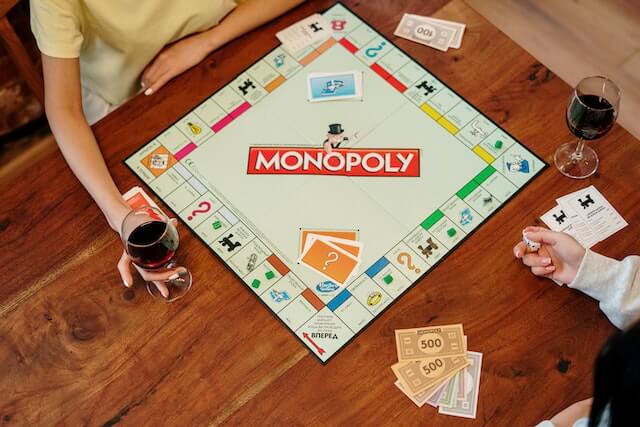
While many board games rely on luck, Monopoly uniquely blends chance with strategic decision-making, making every game a new challenge.
Whether you’re a seasoned player aiming to refine your game or a newbie looking to claim your first victory, understanding the intricacies of Monopoly’s strategy is crucial. Because in the world of board games, as in life, the right strategy can be a game-changer.
The Best Property Investments

In the world of Monopoly, not all properties are created equal. Just as in real estate, location and value play a pivotal role in determining the potential return on investment. But which properties truly offer the best bang for your buck? Let’s dive deep into the Monopoly board and uncover the hidden gems.
1. Understanding Property Value
Each color set on the Monopoly board has its own unique price point and rent structure. While it might be tempting to aim for the high-priced blue properties like Park Place and Boardwalk, they aren’t necessarily the best investments. Why? It’s all about ROI (Return on Investment). The cost to develop and the frequency with which players land on these spaces play a crucial role in determining their true value.
2. The Power of the Orange Set
Surprisingly to many, the orange set—comprising St. James Place, Tennessee Avenue, and New York Avenue—is often considered the crown jewel of Monopoly properties. Their position right after the Jail makes them a frequent landing spot, especially given the common dice rolls of 6, 8, and 9. When fully developed with houses or hotels, these properties can quickly drain opponents’ funds, making them a strategic powerhouse.
3. The Underestimated Red and Yellow Sets
Following closely behind the oranges are the red and yellow sets. Their mid-tier pricing combined with a decent frequency of visits makes them solid investments. While they might not have the same ROI potential as the oranges, they offer a balanced combination of affordability and earning potential.
4. The High-Risk, High-Reward Blues
Boardwalk and Park Place are the game’s premium properties. Their high rent, especially when developed, can be game-ending for opponents. However, they come with a hefty price tag and are less frequently landed on compared to other sets. They’re the equivalent of luxury real estate: impressive but not always the most strategic investment.
Conclusion
In Monopoly, as in real estate, the best investments aren’t always the most expensive ones. It’s about understanding the board, gauging player movement, and making strategic decisions based on ROI. The next time you play, remember: while everyone’s chasing the glitz and glamour of the blues, the humble orange set might just be your ticket to Monopoly dominance.
Railroads: The Silent Game-Changers
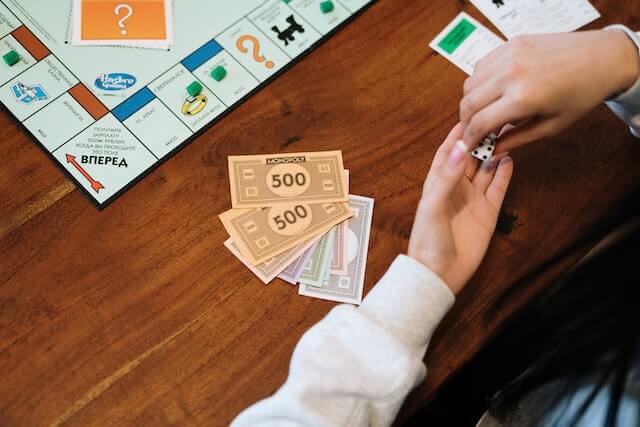
In the high-stakes world of Monopoly, players often get dazzled by the allure of color-coded properties and the potential of building houses and hotels. Amidst this race for real estate dominance, there’s a set of properties that often fly under the radar, yet hold immense strategic power: the Railroads. Let’s embark on a journey to understand why these transportation hubs are the silent game-changers of Monopoly.
1. The Consistent Cash Flow
Unlike other properties, railroads don’t require any further investment. There are no houses or hotels to build. Yet, every time an opponent lands on one, there’s a steady inflow of cash. Own one railroad, and you charge a modest rent. But as you accumulate more, the rent exponentially increases, ensuring a consistent and escalating cash flow throughout the game.
2. Strategic Board Positioning
The four railroads—Reading, Pennsylvania, B&O, and Short Line—are strategically spread across the board. This distribution ensures that as players move around, there’s a high likelihood of landing on a railroad. In essence, they act as recurring toll booths, silently siphoning funds from your opponents.
3. The Power of Monopoly
Owning all four railroads is akin to having a transportation monopoly. The rent jumps to a whopping $200 when an opponent lands on any of them. This consistent drain of funds can be especially debilitating in the early to mid-game, giving the railroad owner a significant financial edge.
4. A Bargaining Chip
Railroads, due to their consistent earning potential, become valuable bargaining chips in trades. They can be the sweetener in a deal or the main asset when negotiating with opponents. Their value in trade discussions can often surpass even some of the more expensive properties.
5. Shifting the Balance
While railroads might not have the flashy impact of a hotel on Boardwalk, their silent and consistent drain of funds can shift the balance of power. An opponent might be rich in properties but cash-poor due to frequent railroad rents, making them vulnerable in the later stages of the game.
Conclusion
In the grand scheme of Monopoly, railroads are the unsung heroes. They might not grab headlines like the coveted blue properties, but their strategic importance is undeniable. Smart players recognize this and leverage railroads as the silent, yet potent game-changers they truly are. The next time you play, consider this: while properties come and go, the steady chug of the railroad engine can drive you to victory.
To Buy or Not to Buy: Making Smart Purchases
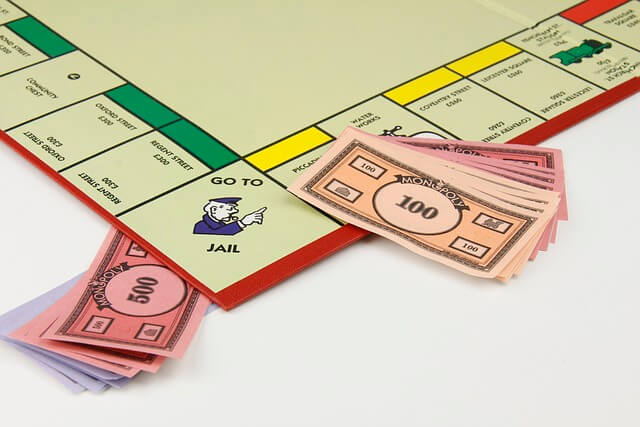
Monopoly, at its core, is a game of real estate and financial strategy. Every roll of the dice presents a new decision, a new opportunity. One of the most debated strategies among Monopoly aficionados is whether to buy every property you land on or to be more selective in your acquisitions. Let’s dive deep into this strategy and uncover the pros, cons, and the art of making smart purchases.
1. The “Buy Everything” Approach
Many players swear by the “buy everything in sight” strategy. The idea is simple: the more properties you own, the higher the chances of opponents landing on them and paying you rent.
Pros
- Diversified Portfolio: Owning a mix of properties increases the odds of earning rent every turn.
- Trading Power: A diverse property set gives you leverage in trade negotiations. You might just have the one property another player desperately needs to complete a set.
Cons
- Cash Drain: Buying every property can leave you cash-poor, especially if you land on high-rent districts or need to pay taxes and fines.
- Missed Opportunities: With limited cash, you might not have the funds to invest in houses or hotels when the opportunity arises.
2. The “Selective Purchasing” Approach
This strategy is about quality over quantity. Players focus on acquiring specific sets or high-rent properties, ensuring they get the best return on their investments.
Pros
- Focused Investment: By targeting specific sets, you can quickly start building houses and hotels, ramping up the rent and putting pressure on opponents.
- Cash Reserves: Being selective ensures you have a cash buffer for unexpected expenses or to capitalize on prime properties when you land on them.
Cons
- Dependency: If you’re too focused on specific properties, you might find yourself at the mercy of an opponent who owns a crucial piece of your strategy.
- Missed Rent Opportunities: Being too selective might mean fewer rent payments from opponents, especially in the early game.
Strategies for Selective Purchasing:
- Target High Traffic Zones: Focus on properties that players land on frequently. The orange and red sets, for instance, are high-traffic due to their position after the Jail.
- Corner the Market: If you notice an opponent trying to complete a set, consider buying a key property in that set, even if it’s not part of your initial strategy. This gives you a valuable trading chip.
- Stay Liquid: Always ensure you have enough cash on hand. This allows you to participate in auctions, invest in developments, or pay off hefty rents without mortgaging properties.
Conclusion
Whether you’re a property magnate buying up every piece of land or a strategic investor hand-picking your acquisitions, Monopoly offers a myriad of strategies to explore. The key is to adapt, read the board, and anticipate your opponents’ moves. Remember, in the world of Monopoly, it’s not just about owning properties; it’s about making them work for you. So, the next time you’re faced with the decision to buy or not to buy, weigh your options, think ahead, and make the smart choice that’ll pave your way to Monopoly dominance.
The House vs. Hotel Debate
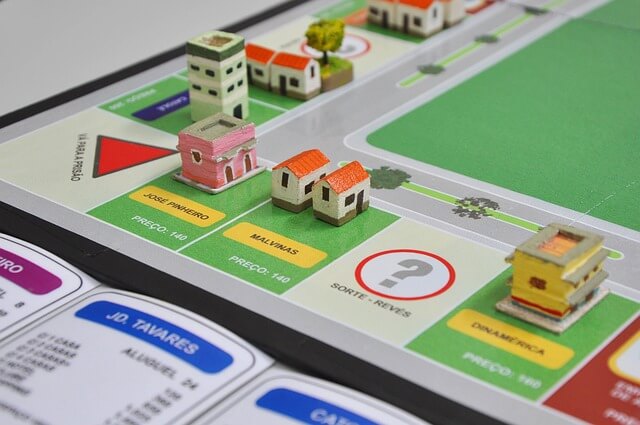
Monopoly isn’t just a game of chance; it’s a game of strategy. And one of the most hotly debated strategies among Monopoly enthusiasts centers around property development: Should you rush to build hotels or strategically invest in houses first? Let’s break down this debate and uncover the optimal strategy for maximizing returns on your property investments.
1. The Power of Houses
At first glance, hotels might seem like the ultimate goal. After all, they command the highest rents. However, there’s a strategic advantage to holding off on that hotel upgrade and focusing on houses first.
Benefits of Investing in Houses:
- Incremental Rent Increases: Each house you add to a property significantly boosts the rent, allowing you to start generating higher returns faster.
- Resource Scarcity: There are only 32 houses in the game. By strategically building houses and not rushing to upgrade to hotels, you can create a housing shortage. This move can stymie opponents’ development plans, giving you a competitive edge.
- Flexibility: Houses give you more control over your cash flow. You can choose to build gradually, ensuring you always have liquidity for other game scenarios.
2. The Leap to Hotels
While houses offer strategic advantages, hotels are the endgame. They represent the pinnacle of property development and have the potential to bankrupt opponents in a single landing.
When to Consider Hotels:
- Dominant Position: If you have a strong cash reserve and own multiple property sets with houses, upgrading to hotels can be the final nail in the coffin for your opponents.
- Breaking the Housing Shortage: If an opponent is using the house scarcity strategy, upgrading to hotels can free up houses for other players, potentially shifting the game’s dynamics.
- High Traffic Areas: If you own a high-traffic property set, like the oranges or reds, upgrading to hotels can maximize your returns, given the higher likelihood of opponents landing on them.
Maximizing Returns on Property Investments:
- Balanced Development: Instead of pouring all your resources into one property set, consider a balanced approach. Build three houses on each property of a set before moving to the fourth house or a hotel. This strategy ensures consistent rent increases.
- Watch Your Opponents: Keep an eye on opponents’ cash reserves. If they’re running low, it might be worth rushing a hotel on a high-traffic property to apply pressure.
- Stay Liquid: Always ensure you have enough cash for other game scenarios. It’s tempting to invest every dollar into property development, but Monopoly is unpredictable. Having a cash buffer can save you from bankruptcy.
Conclusion
The house vs. hotel debate is a testament to Monopoly’s strategic depth. While hotels are undeniably powerful, there’s a compelling case for the strategic development of houses. The key is to adapt to the game’s flow, read your opponents, and make informed decisions. Whether you’re a house mogul or a hotel tycoon, remember that in Monopoly, the best strategy is one that keeps you ahead of the competition and always in the game.
Avoiding Bankruptcy: Tips and Tricks
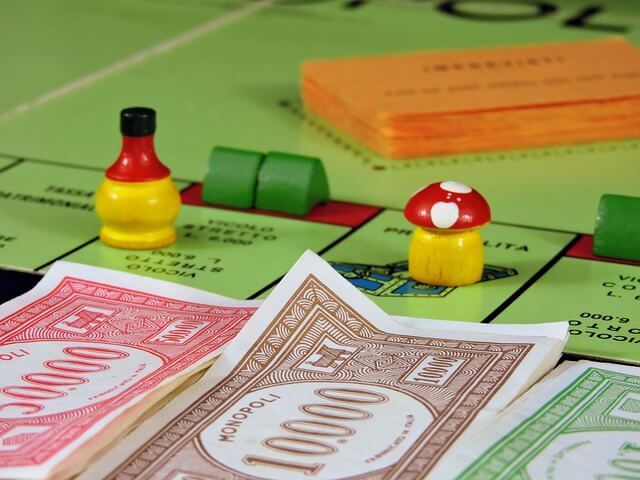
In the world of Monopoly, bankruptcy is the grim reaper that lurks around every corner. One wrong move, one ill-advised purchase, or an unfortunate roll of the dice can send even the most seasoned player into financial ruin. But fear not! With the right strategies and a keen sense of the game’s dynamics, you can navigate the treacherous waters of Monopoly and keep bankruptcy at bay. Let’s dive into the art of managing finances and the crucial role of trading and negotiation.
1. Mastering Financial Management
Monopoly, at its core, is a game of financial strategy. And just like in the real world, managing your finances wisely is the key to long-term success.
Key Financial Tips:
- Budget Wisely: Always keep a reserve of cash on hand. It’s tempting to spend all your money as soon as you earn it, but unexpected expenses (like landing on a hotel-laden Boardwalk) can arise at any moment.
- Assess Before You Invest: Before buying a property, consider its return on investment. Some properties offer better long-term value than others.
- Avoid Overextending: It’s easy to get caught up in the excitement of building houses and hotels, but overextending can leave you cash-strapped and vulnerable.
2. The Power of Trading and Negotiation
Monopoly isn’t just about what happens on the board; it’s also about what happens off it. Trading and negotiation are integral parts of the game, and mastering them can mean the difference between victory and bankruptcy.
Trading Tips:
- Know Your Worth: Before entering any negotiation, know the value of your properties. This knowledge will give you leverage in discussions.
- Seek Mutually Beneficial Deals: The best trades are those where both parties benefit. Look for opportunities where a trade can strengthen both your positions.
- Play the Long Game: Sometimes, it’s worth making a short-term sacrifice for a long-term gain. If trading away a property now will give you a full set later, it might be worth the risk.
Negotiation Strategies:
- Build Relationships: Monopoly is a social game. Building relationships with other players can open doors to favorable deals down the line.
- Bluff Wisely: A well-timed bluff can tilt a negotiation in your favor, but use this strategy sparingly. If you’re caught bluffing too often, other players might be wary of dealing with you.
- Understand Your Opponent: Every player has a strategy. By understanding their goals and fears, you can tailor your negotiation tactics to be more effective.
Conclusion
Avoiding bankruptcy in Monopoly requires a blend of financial acumen, strategic foresight, and interpersonal skills. By managing your finances wisely, understanding the power of trading, and mastering the art of negotiation, you can navigate the game’s challenges and emerge as a Monopoly magnate. Remember, in the high-stakes world of Monopoly, it’s not just about owning properties; it’s about playing the game smarter than everyone else.
The Odds Game: Understanding Probabilities
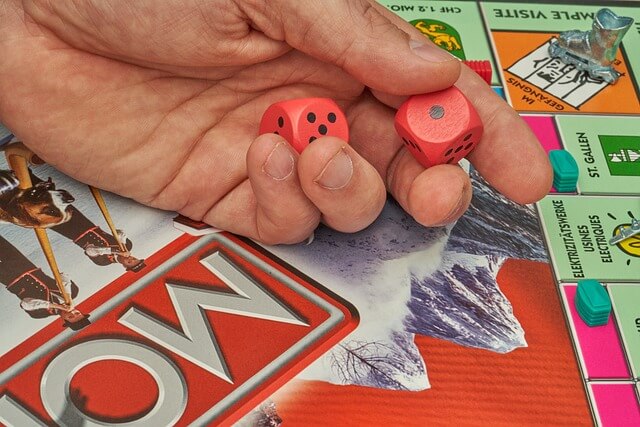
Monopoly, like life, is a game of chances. While strategy, negotiation, and financial acumen play significant roles, the roll of the dice can often dictate the course of the game. But what if you could predict the unpredictable? What if you could harness the power of probabilities to inform your Monopoly strategy? Let’s delve deep into the odds game and uncover how understanding probabilities can give you a competitive edge.
1. The Science Behind the Dice
At first glance, the outcome of a dice roll might seem entirely random. But with two six-sided dice in play, some numbers are statistically more likely to come up than others.
Dice Probabilities:
- 7 is King: With six different combinations (1-6, 2-5, 3-4, 4-3, 5-2, 6-1), the number 7 is the most probable outcome of a dice roll.
- 2 and 12 are Outliers: Only one combination can produce these numbers (1-1 for 2 and 6-6 for 12), making them the least likely outcomes.
- The Middle Ground: Numbers 5 through 9 have relatively high probabilities, with multiple combinations leading to these outcomes.
2. Translating Probabilities to Properties
Knowing the odds of rolling a particular number can give you insights into which properties you and your opponents are most likely to land on.
Property Probabilities:
- The Orange Set: Given their position from the Jail, properties in the orange set (St. James Place, Tennessee Avenue, and New York Avenue) have a higher probability of being landed on, especially after a typical 6-8 roll post-jail release.
- Railroads: Their even distribution around the board and the high likelihood of rolling numbers like 5, 6, 7, 8, and 9 make railroads some of the most landed-on properties.
- Beware the Greens: Due to their position on the board and the cost of development, the green set (Pacific Avenue, North Carolina Avenue, and Pennsylvania Avenue) might not offer as much value as their price suggests.
3. Informing Your Strategy with Probabilities
Understanding the odds can be a game-changer. It can inform decisions about which properties to buy, which sets to complete, and where to invest your money.
Strategic Takeaways:
- Prioritize High-Traffic Areas: Invest in properties that players are more likely to land on based on dice probabilities.
- Balance Risk and Reward: While it’s essential to use probabilities to inform your decisions, remember that Monopoly is still a game of chance. Always be prepared for the unexpected.
- Stay Informed: As the game progresses and players develop different properties, continually reassess the board’s landscape and adjust your strategy accordingly.
Conclusion
Monopoly isn’t just a game of luck; it’s a game of calculated risks. By understanding the probabilities behind each dice roll and the chances of landing on specific properties, you can make informed decisions that propel you to victory. In the world of Monopoly, knowledge truly is power. So, the next time you roll the dice, remember: it’s not just about chance; it’s about playing the odds to your advantage.
Common Mistakes and How to Avoid Them
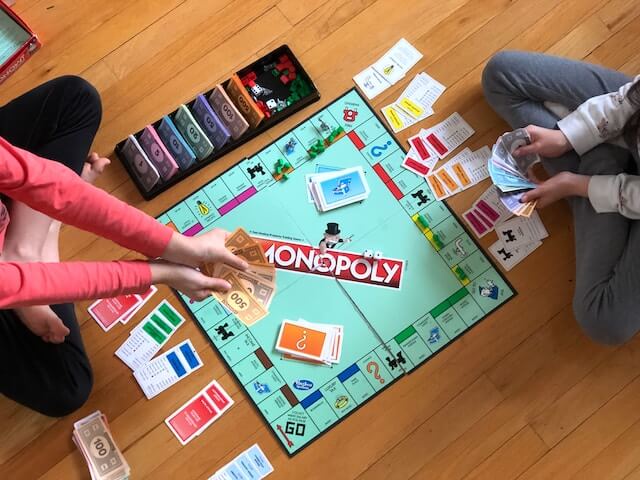
Monopoly, a game that has been cherished for generations, is more than just a pastime; it’s a battle of wits, strategy, and sometimes, sheer luck. But even the most seasoned players can fall into common traps that can turn the tide of the game. Let’s dive into some of these frequent strategic errors and arm you with the knowledge to stay one step ahead of the competition.
1. Overextending Finances
The Mistake: Players often get caught up in the excitement of purchasing every property they land on, leading to a rapid depletion of their cash reserves.
The Fix: Always keep a buffer of cash on hand. This ensures you have enough to pay rent, invest in houses or hotels, or capitalize on a strategic opportunity.
2. Neglecting the Power of Railroads and Utilities
The Mistake: Overlooking the potential of railroads and utilities because they don’t offer the flashy returns of property sets.
The Fix: Acquiring all railroads or utilities can provide a steady income and put pressure on opponents. They’re also more frequently landed on due to their distribution around the board.
3. Holding Onto Properties for Too Long
The Mistake: Players sometimes hoard properties, hoping to use them as bargaining chips later in the game.
The Fix: If you can’t complete a set, consider trading or selling early on. Holding onto a property without the potential for development can hinder your progress.
4. Ignoring the Importance of Trading
The Mistake: Some players avoid trading, fearing they’ll give away a potential advantage.
The Fix: Monopoly is as much about negotiation as it is about strategy. Engage in trades that are mutually beneficial, and always be on the lookout for deals that can complete your property sets.
5. Overinvesting in Hotels Too Soon
The Mistake: Jumping straight to hotels without fully capitalizing on the rent potential of houses.
The Fix: Before transitioning to hotels, maximize the number of houses on your properties. Four houses on each property can often yield better returns than one hotel.
6. Underestimating the Value of Jail Later in the Game
The Mistake: Viewing jail as purely a setback, especially in the game’s later stages.
The Fix: In the later stages, when many properties are developed, staying in jail can be a strategic move. It keeps you from landing on opponents’ properties while still collecting rent.
Conclusion
Monopoly, like any strategy game, is riddled with potential pitfalls. But by recognizing these common mistakes and arming yourself with effective counter-strategies, you can navigate the board with confidence. Remember, every champion Monopoly player was once a novice who learned not just from their successes, but also from their missteps. So, keep these tips in mind, stay adaptable, and may your next game of Monopoly be your best yet!
Conclusion
Monopoly, a game that has stood the test of time, isn’t just about rolling dice and moving pieces around a board. It’s a testament to the power of strategy, decision-making, and a bit of luck. As we’ve journeyed through the intricacies of the game, one thing becomes abundantly clear: a well-thought-out strategy is paramount.
Every roll, every purchase, and every trade can be a game-changer. But it’s not just about winning; it’s about evolving. Each game is a learning experience, a chance to refine your tactics, understand your opponents better, and adapt to the ever-changing landscape of the board. Mistakes? They’re not setbacks; they’re lessons. Triumphs? They’re not just victories; they’re validations of strategies well executed.
But let’s not forget the heart of the matter. While strategies and tactics play a significant role, the essence of Monopoly – like all board games – is enjoyment. It’s about those moments of laughter when someone lands on a heavily-mortgaged property, the thrill of completing a color set, and the camaraderie that comes from a game well-played.
So, as you set forth on your next Monopoly adventure, remember to play smart, adapt, learn, and above all, enjoy the journey. After all, the ultimate goal isn’t just about achieving victory; it’s about enjoying the game and the memories you create along the way. Happy gaming!
Leave a Reply